南通环球雅思--2013年5月18日雅思听力回忆及解析
雅思听力2013 年总结与解析
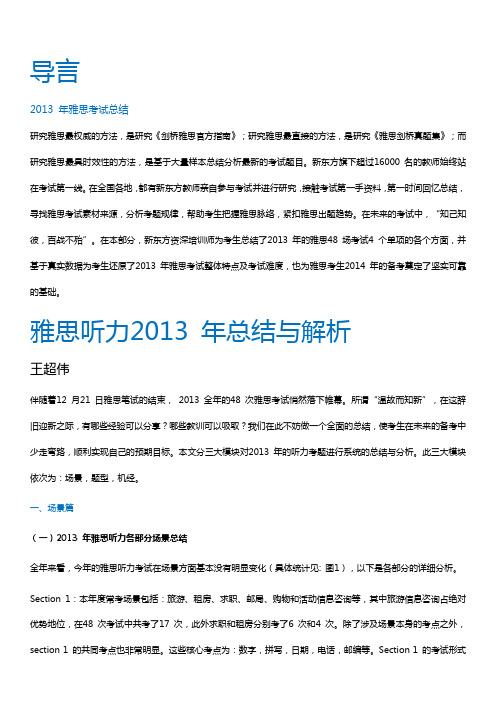
导言2013 年雅思考试总结研究雅思最权威的方法,是研究《剑桥雅思官方指南》;研究雅思最直接的方法,是研究《雅思剑桥真题集》;而研究雅思最具时效性的方法,是基于大量样本总结分析最新的考试题目。
新东方旗下超过16000 名的教师始终站在考试第一线。
在全国各地,都有新东方教师亲自参与考试并进行研究,接触考试第一手资料,第一时间回忆总结,寻找雅思考试素材来源,分析考题规律,帮助考生把握雅思脉络,紧扣雅思出题趋势。
在未来的考试中,“知己知彼,百战不殆”。
在本部分,新东方资深培训师为考生总结了2013 年的雅思48 场考试4 个单项的各个方面,并基于真实数据为考生还原了2013 年雅思考试整体特点及考试难度,也为雅思考生2014 年的备考奠定了坚实可靠的基础。
雅思听力2013 年总结与解析王超伟伴随着12 月21 日雅思笔试的结束,2013 全年的48 次雅思考试悄然落下帷幕。
所谓“温故而知新”,在这辞旧迎新之际,有哪些经验可以分享?哪些教训可以吸取?我们在此不妨做一个全面的总结,使考生在未来的备考中少走弯路,顺利实现自己的预期目标。
本文分三大模块对2013 年的听力考题进行系统的总结与分析。
此三大模块依次为:场景,题型,机经。
一、场景篇(一)2013 年雅思听力各部分场景总结全年来看,今年的雅思听力考试在场景方面基本没有明显变化(具体统计见: 图1),以下是各部分的详细分析。
Section 1:本年度常考场景包括:旅游、租房、求职、邮局、购物和活动信息咨询等,其中旅游信息咨询占绝对优势地位,在48 次考试中共考了17 次,此外求职和租房分别考了6 次和4 次。
除了涉及场景本身的考点之外,section 1 的共同考点也非常明显。
这些核心考点为:数字,拼写,日期,电话,邮编等。
Section 1 的考试形式就是把场景本身的考点和这些共同考点有机地整合在一起从而形成本部分的10 个考题。
考生只需根据这些考点设计一个对话,就可以准确的掌握本部分语言和答案特征,并结合实际练习找到自己的失分点,从而轻松在此部分拿到高分。
雅思听力原文及答案

Keys:Each question correctly answered scores 1 mark. CORRECT SPELLING IS NEEDED IN ALL ANSWERS.注:Questions 35, 38 and 40 (IN EITHER ORDER, BOTH REQUIRED FOR ONE MARK)If you score…Audio ScriptsSECTION 1LYNDA: Sara, I’ve heard that you want to move into a homestay family. Is that correct SARA: Yes, that’s right. I’ve been staying with my aunt and now my cousin is arriving from Singapore and my aunt needs the room for him.LYNDA: Oh, that’s bad luck. Well, I’II need to get some particulars first. Sara, what’s your full nameSARA: Sara Lim, and that’s Sara without the ‘h’ at the end.LYNDA: Mmm. How old are you, SaraSARA: Twenty-three, only just. It was my birthday on the twenty-first of August.LYNDA: Happy birthday for yesterday. How long have you been in AustraliaSARA: (Q1) A year in Adelaide and six months in Sydney. I prefer Sydney. I’ve got more friends here.LYNDA: What’s your address at your aunt’s houseSARA: Flat one, five three nine (Q2) Forest Road, Canterbury. And the post code is two, o, three, six.LYNDA: OK. What are you studying nowSARA: I was studying General English in Adelaide and now I’m doing (Q3) Academic English, because I’m trying to get into Medicine next year.LYNDA: That sounds good, but it’ll take you a long time. When would you like to move out from your aunt’sSARA: My cousin arrives on Friday morning, so I’d better be out on (Q4) Thursday. LYNDA: What, the seventh of SeptemberSARA: Yes, that’s right.LYNDA: That doesn’t leave us much time. Right, OK. I need to know what kind of accommodation you’d like, so I can get you something suitableSARA: Can I (Q5) share a room with someone else I’ve been alone in my room at my aunt’s and I’ve always shared with my sister and I like that.LYNDA: Yes, fine. That’ll save you money too. Would you like to live with a family or do you think that a (Q6) single person would be better for you I have lots of very nice singlepeople on my books.SARA: Do you have any women living alone, retired womenLYNDA: Yes, I have quite a few whose children have grown up and left home. In fact, I have some really lovely retired ladies, living by themselves, who just love the company of students. Most of them live in (Q7) flats, but that’s not a problem for you, is it SARA: Not at all. I’m used to that. My aunt lives in a flat too, remember. I’m not use to a big house with a garden, swimming pool, pets and all that.LYNDA: OK, fine. I know quite a bit about what you want now. I should let you know that your rent will be a hundred and sixty dollars per week. You’ll have to pay me three hundredand twenty dollars as a (Q8) deposit before you move in. The deposit is as insurance, incase you break something. You’ll need to pay (Q9) monthly to me, by cash or cheque, Idon’t mind. You don’t need to pay for gas, electricity or water, but you will need to payyour proportion of the (Q10) phone bill. Most families do that on an honour system,but you’ll have to wait and seeSARA: Mmm.LYNDA: Have you got any more questions for meSARA: When will you know where I can goLYNDA: I’II work on it now, so come and see me tomorrow and I should have some news for you then.SARA: Thanks a lot.LYNDA: Goodbye. See you tomorrow – after lunch would be better for me.SARA: OK, see you then. Bye.SECTION 2GEOFFREY: Good evening, and in this week’s edition of ‘Focus on the Arts’, Jane Hemmington is going to fill us in on what’s in store for us at this year’s Summer Festival. Over to you,Jane.JANE: Thank you, Geoffrey. This year, the Summer Festival is the biggest we’ve ever seen, so there should be something for everybody. This is the third year they’ve run it and the timing’s slightly different: for the last couple of years it’s been around the fifth to seventeenth, but this year they wanted to allow everyone enough time to recover from the first of January celebrations and they’ve put it (Q11) at the end of the month.The programme has sensational theatre, dance and also a large number of art exhibitions, but the thing the Festival is most famous for is its great street music. For today’s report though, Geoffrey, I’m looking at some of the (Q12) theatrical events that you might like to see; in particular, at this year’s theme – circuses.I’m going to tell you about two circus performances, but there are (Q13) plenty of others in the progralmme. I’ve chosen these because they represent distinct movements within circus performance. The first is the Circus Romano from Italy. As this is a travelling circus, it follows a long tradition by performing (Q14) in a marquee– which is really like a canvas portable building, usually put up in a green space or car park, rather than in a theatre or stadium.In spite of this, Circus Romano isn’t at all like the traditional circuses I grew up with. There are no animals – just very talented clowning and acrobatic routines. The show has a lot of very funny moments, especially at the beginning, but the best part is the music and (Q15) lighting. They’re magical. At forty-five dollars it’s very expensive anyway – it’s really for (Q16) adult tastes. In fact, much of it would be wasted on children – so I suggest you leave them at home.The second circus performance is Circus Electrica at the (Q17) Studio Theatre. The purists are suggesting that this isn’t a circus at all. It’s a showcase for skills in dance and magic, rather than the usual ones you expect in a circus. With only six performers it’s a small production, which suits the venue well – the Studio only seats about two hundred people. For my money it’s the aerial displays which are outstanding as well as the magical tricks – features which are missing from Circus Romano. An interesting feature of the show is that the performers are so young – the youngest is only fourteen. But it’s still well worth seeing: a good one for (Q18) the whole family.And finally, as it’s summer, you may wish to see some of the Festival performances that are being presented outdoors. Like the famous Mekong Water Puppet Troupe, performing in the (Q19) City Gardens this week. Now, water puppetry is amazing! It’s large puppets on long sticks, controlled by puppeteers standing waist deep in the lake. The puppets do comedy routines andthere is some terrific formation dancing. This is a fantastic show and the best moment comes at the end –seeing the puppeteers. When the troupe walks up out of the water, you get this amazing feeling. It’s really hard to believe that what you’ve been watching is lifeless wood and cloth. As an adult, I had a great time, but I did note that other older people in the audience weren’t quite as taken with it as I was. It’s a must for (Q20) young children though, and that’s the audience it’s really aimed at.Well, that’s all I’ve time for today, but I’II be back next week with more news of what’s worth seeing and what it’s best to miss.SECTION 3OFFICER: Hello. Er, I’m Dawn Matthews.STUDENT: Yes, hello. I’ve been referred to you because I’m enquiring about the refresher courses that you run. I’d like to find out a bit more about them.OFFICER: OK. Well, we run quite a few different short courses for students who are either (Q21)returning to study or studying part-time. Um, tell me about your situation. STUDENT: Well, I think that I really need some help in preparing for the coming semester, especially to build up my confidence a bit and help me study effectively because, yousee, I’ve been out in the work-force for nearly twelve years now, so it really is a longtime since I was last a student.OFFICER: Yes, it can seem like a long time, can’t it Um, well, let me start by telling you what courses we have that might suit you. Are you an undergraduate or postgraduate Artsor SciencesSTUDENT: Undergraduate, and I’m in the Business faculty.OFFICER: Right then. First of all, there’s our intensive ‘Study for Success’ seminar on (Q22) the first and second of February. It’s aimed at students like you who are uncertain aboutwhat to expect at college, and looks at a fairly wide range of approaches to universitylearning, to motivate you to begin your study and build on your own learningstrategies.STUDENT: Mm, that sounds good. What are some of the strategies that are presented OFFICER: Well, we try to cover all aspects of study. Some of the strategies in writing, for example, would be improving your planning for writing, organising your thinking andbuilding some techniques to help you (Q23) write more clearly. With reading,there’ll be sessions aimed at getting into the habit of (Q24) analysing material asyou read it, and tips to help you record and remember what you have read. It reallyis very important to begin reading confidently right from the beginning. STUDENT: Mm.OFFICER: There’s also advice on how to get the most from your lectures and practice in giving confident presentations, as well as how to prepare for exams.STUDENT: What about the motivational side of thingsOFFICER: Ah. Well, there’s a range of motivational exercises that we do to help the students feel (Q25) positive and enthusiastic about their study. The process of learning andexploring a subject can lead to a whole new way of looking at the world, and thestudy skills and techniques that you build up can be applied in all sorts of differentways.STUDENT: Actually, I… I’m very excited about the whole thing of taking up studying again but, you know, I’m a little nervous about whether I’ll manage to get everything done. Isuppose it’s the same for all mature studentsOFFICER: Of course it is. Two of the key components of the course are (Q26) time management and overcoming procrastination. People discover that, once they learnto plan their days, all the work can be accomplished and there’ll still be time forleisure.STUDENT: Is there an enrolment feeOFFICER: Well, er, oh, just a minute, let’s see . . . Ah, the cost is thirty pounds, which includes all course materials and morning tea. You have to arrange your own lunch. STUDENT: That wouldn’t be a problem. I already make sandwiches for my three kids and my wife and myself every day. I won’t have to change my routine.OFFICER: No. Now, I need to tell you that this is a very popular course and it’s essential that you (Q27) book well ahead of time. In fact, the Course Convenor tells me that thereare only five places left.STUDENT: What other course might be good for meOFFICER: There is one other that you could benefit from. It’s simply called ‘Learning Skills for University Study’ and is on (Q28) three consecutive mornings starting on a Monday,from nine to twelve, and costs twenty-five pounds. This is aimed at upgrading thestudy skills most school-leavers have and help them cope with the increaseddemands of university study. It focuses mainly on making students more responsiblefor their own success.STUDENT: What sort of things are covered in this courseOFFICER: Well, basically it’s more advanced thinking, note-taking, reading and writing strategies, but also some input about (Q29) stress management.STUDENT: I think I’d be better off (Q30) starting from the basics and looking at all the strategies, don’t youOFFICER: Yes, from what you’ve told me, I think that’s more in line with your situation. STUDENT: Alright then, um, can I book a place on the ‘Study for Success’ seminar course now OFFICER: Yes. Let me just get out a registration form and take down your details.SECTION 4We’re very grateful that the Committee has agreed that a representative for the Students’Union can present students’ suggestions about the design for the proposed new Union building. We appreciate that some of our ideas may not be feasible in the circumstances, but we do feel that it is important that the ultimate beneficiaries of the facilities should have some say in its design.If I could start by briefly explaining what steps were taken to find out student opinion and how we have arrived at conclusions. Firstly, a meeting was held in the current Union for our SU Committee to explain the options. Then we invited all students to submit written suggestions for the design, placing cards in a suggestion box. These suggestions then provided the basis for the design of a (Q31) questionnaire, which was completed by (Q32) approximately two thousand of the College students over a period of three weeks. Finally, the SU Committee collated the resultsand drew up a report. If I can just hand around a copy of that report. This presentation is essentially a summary and discussion of the key points of this report.So, in broad terms, the consensus was as follows. Firstly, regarding the crucial matter of the site, we presented the three options that you have proposed. One: in the city centre, near the Faculty of (Q33) Education; two: on the outskirts of the city, near the park, and three: out of town, near the (Q34) halls of residence. We asked students to cite reasons for and against these sites and, and there was remarkable agreement on all three. Site One was unpopular because of (Q35) traffic and parking problems. Site Two had a number of supporters, mainly because it was close to (Q36) most lecture rooms. And Site Three, out of town, near the halls of residence, was clearly the most popular because of access from living quarters. It was clear that the Union was mainly to be used after lectures. It was also felt that the large site would allow (Q37) more room for a choice of facilities.Our second area of interest was obviously the facilities: there was minimal interest in having a library on the premises, but one option seemed to be a reading room instead – more useful. We would like the current table games room to be replaced with (Q38) a small gym. And, if possible, a small swimming pool – not, of course, Olympic-sized! There was a large number of respondents in favour of a travel agent’s and insurance centre. We also request that there be the offices of the Student Counselling Centre, moving this from the Refectory. There was, however, much disagreement about whether to build a drama theatre. Just over forty per cent of the respondents were in favour, but a largish minority were strongly against it, claiming that it is (Q39) elitist and a waste of funds. Essentially the jury is out on that.Finally, given the number of unfortunate incidents in the current Union over the past few months, a strong point was repeatedly made about security. The recommendations would be at least (Q40) video surveillance and security personnel who would check Student Union cards on request. We doubt if it would be feasible in.Well, this is the summary of the views of the student population. As I say, fuller details are given in our report but I’m happy to take any questions if you have them . . .。
雅思听力真题题库及答案解析

雅思听力真题题库及答案解析雅思听力考试是雅思考试中最难的一部分,也是很多考生非常头疼的一项。
听力测试主要考察考生对于英语听力的理解和应对能力。
为了帮助考生更好地备考,下面介绍一些,希望对大家有所帮助。
一、题库介绍雅思听力真题题库是由各个考试机构和培训机构整理的一些真实考题。
这些题目来自于往年的考试,根据不同的主题和难度进行分类。
这些题库对考生来说非常有用,因为这些题目考察了各个不同的听力技巧和话题,帮助考生更好地了解雅思考试的形式和内容。
二、答案解析每一份题库都配有详细的答案解析,这些解析对于考生来说是很有价值的。
通过仔细阅读答案解析,考生可以了解每道题目的答题技巧和正确答案理由。
在备考过程中,应该多加利用答案解析,强化自己的听力技巧和理解能力。
在解答听力题目时,考生还可以尝试以下一些技巧:1. 使用关键词在听力过程中,考生可以尝试使用笔记本记录一些关键词。
这些关键词可以是一些数字、地点、人名等,有助于理解整个对话或讲座的内容。
通过记录关键词,考生可以更好地把握听力文本的主旨。
2. 注意听力素材中的逻辑关系很多听力题目都会考察考生对于听力素材中逻辑关系的理解。
在听力过程中,考生可以通过注意语调、重读以及连接词等来判断出逻辑关系。
这些细节有助于理解整个对话或讲座的内容。
3. 多练习模拟考试为了更好地备考听力考试,考生应该多练习模拟考试。
模拟考试可以让考生熟悉考试的形式和要求,也可以提高考生的应对能力和时间管理能力。
考生可以选择一些雅思听力真题题库中的题目进行模拟考试练习。
4. 扩大听力素材范围除了做真题题库外,考生还可以通过扩大听力素材范围来提高听力能力。
可以通过听英语广播、看英语电影或者参加英语角等方式来锻炼自己的听力技巧。
通过接触更多的听力素材,考生可以逐渐提高自己的听力理解和应对能力。
总结:雅思听力考试是一项需要大量练习和理解的考试,通过多做题库题目并结合答案解析,考生可以提高自己的听力能力和应对能力。
环球雅思测试题及答案
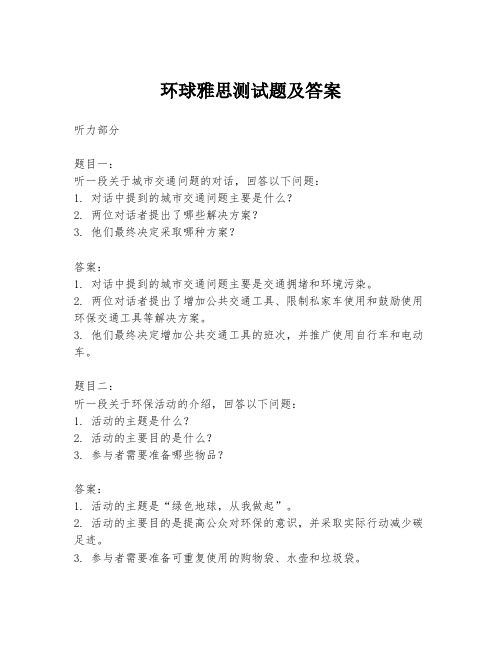
环球雅思测试题及答案听力部分题目一:听一段关于城市交通问题的对话,回答以下问题:1. 对话中提到的城市交通问题主要是什么?2. 两位对话者提出了哪些解决方案?3. 他们最终决定采取哪种方案?答案:1. 对话中提到的城市交通问题主要是交通拥堵和环境污染。
2. 两位对话者提出了增加公共交通工具、限制私家车使用和鼓励使用环保交通工具等解决方案。
3. 他们最终决定增加公共交通工具的班次,并推广使用自行车和电动车。
题目二:听一段关于环保活动的介绍,回答以下问题:1. 活动的主题是什么?2. 活动的主要目的是什么?3. 参与者需要准备哪些物品?答案:1. 活动的主题是“绿色地球,从我做起”。
2. 活动的主要目的是提高公众对环保的意识,并采取实际行动减少碳足迹。
3. 参与者需要准备可重复使用的购物袋、水壶和垃圾袋。
阅读部分题目三:阅读一篇关于全球化对教育的影响的文章,回答以下问题:1. 文章提到全球化对教育有哪些积极影响?2. 文章中提到的教育挑战是什么?3. 作者认为如何克服这些挑战?答案:1. 文章提到全球化对教育的积极影响包括资源共享、文化交流和教育方法的创新。
2. 文章中提到的教育挑战包括文化冲突、信息过载和教育不平等。
3. 作者认为通过加强国际合作、培养批判性思维和提供平等教育机会来克服这些挑战。
题目四:阅读一篇关于科技在医疗领域的应用的文章,回答以下问题:1. 文章中提到的科技在医疗领域的主要应用是什么?2. 这些科技应用对患者有哪些好处?3. 文章是否提到了这些科技应用的潜在风险?答案:1. 文章中提到的科技在医疗领域的主要应用包括远程医疗、人工智能诊断和个性化医疗。
2. 这些科技应用对患者的好处包括提高诊断准确性、减少等待时间和提供更个性化的治疗方案。
3. 文章提到了这些科技应用的潜在风险,如数据安全问题和对医疗专业人员的依赖减少。
写作部分题目五:写一篇关于“社交媒体对青少年的影响”的议论文。
2013年雅思听力真题回忆汇总

2013年雅思听力真题回忆汇总10月10日真题回忆:(一旧三新)SECTION 1:场景分析:电话预定酒店(举办party)常考场景,主要考点:人,地名拼写,电话,日期,价格,内容等。
题型:全部信息填空。
需要掌握词汇:ground floorSECTION 2:场景分析:讲一个railway之类的地点之前用来运输iron,后演变为一个tourist area之类的景点。
题型:选择+配对需要掌握词汇:engine, mine, tourist attraction, accommodation, wildlifeSECTION 3:场景分析:师生课题讨论,重点关注研究方法,内容关于classroom management on young children的项目具体规划。
(参考C6-2-3)题型:选择+配对需要掌握词汇:open question, college administration, observe, questionnaire, web researchSECTION 4:V111203场景分析:关于棉织品对于环保和时尚的影响:Cottonproduction’s effects on the environment and relative fashion trends.题型:全填空,注意定位词。
需要掌握的词汇:process the cotton, machine, suitable, irrigation system, energy, inspire, innocence, freedom, protective, maintenance, nature, salty10月12日真题回忆:(二旧二新)SECTION 1:场景分析:入学咨询题型:信息填空题需要掌握词汇:golf court, piano, Spanish, Wednesday SECTION 2: V100529场景分析:寄宿家庭及申请介绍,租房场景,考察寄宿条件,优点,申请流程,注意事项。
南通环球雅思2014.3.15雅思听力真题回忆
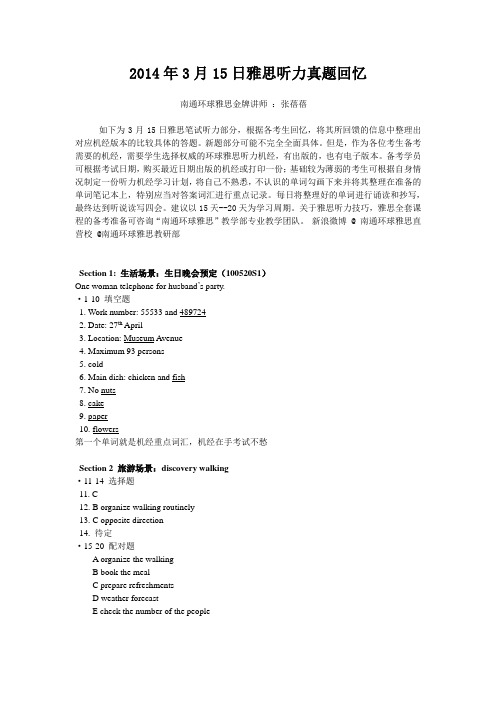
2014年3月15日雅思听力真题回忆南通环球雅思金牌讲师:张蓓蓓如下为3月15日雅思笔试听力部分,根据各考生回忆,将其所回馈的信息中整理出对应机经版本的比较具体的答题。
新题部分可能不完全全面具体。
但是,作为各位考生备考需要的机经,需要学生选择权威的环球雅思听力机经,有出版的,也有电子版本。
备考学员可根据考试日期,购买最近日期出版的机经或打印一份;基础较为薄弱的考生可根据自身情况制定一份听力机经学习计划,将自己不熟悉,不认识的单词勾画下来并将其整理在准备的单词笔记本上,特别应当对答案词汇进行重点记录。
每日将整理好的单词进行诵读和抄写,最终达到听说读写四会。
建议以15天--20天为学习周期。
关于雅思听力技巧,雅思全套课程的备考准备可咨询“南通环球雅思”教学部专业教学团队。
新浪微博 @ 南通环球雅思直营校 @南通环球雅思教研部Section 1: 生活场景:生日晚会预定(100520S1)One woman telephone for husband’s party.·1-10 填空题1. Work number: 55533 and 4897242. Date: 27th April3. Location: Museum Avenue4. Maximum 93 persons5. cold6. Main dish: chicken and fish7. No nuts8. cake9. paper10. flowers第一个单词就是机经重点词汇,机经在手考试不愁Section 2 旅游场景:discovery walking·11-14 选择题11. C12. B organize walking routinely13. C opposite direction14. 待定·15-20 配对题A organize the walkingB book the mealC prepare refreshmentsD weather forecastE check the number of the peopleSection 3 学术场景:男女选专业和学校(V66)·21-23 选择题21. Why did Lucy choose journalism? C22. How many students can find their jobs on completion of course? BA 66%B 88%C 98%23. Why did Lucy choose her university? CA the theoretical backgroundB TV facilitiesC work placement·24-30 填空题24-25 Why did Jack choose science24 easy to understand and it is 25 challenging26-27 the girl’s school: though it is not inside downtown, but social life is good: because 26 a cinema and 27 lots of clubs28 lots of activities29 1 year30 move to apartmentSection 4 学术讲座:vertical farmingVertical farming和traditional farming 对比·31-40 填空题irrigationoilfoodtemperaturehabitat losssoilpopulationfloodswindhumidity此次考试较难:habitat和humidity拼写容易出错。
雅思18test3part2听力解析
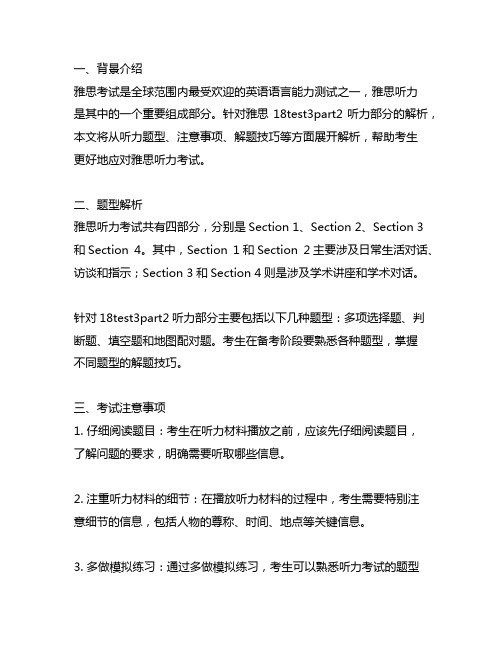
一、背景介绍雅思考试是全球范围内最受欢迎的英语语言能力测试之一,雅思听力是其中的一个重要组成部分。
针对雅思18test3part2听力部分的解析,本文将从听力题型、注意事项、解题技巧等方面展开解析,帮助考生更好地应对雅思听力考试。
二、题型解析雅思听力考试共有四部分,分别是Section 1、Section 2、Section 3和Section 4。
其中,Section 1和Section 2主要涉及日常生活对话、访谈和指示;Section 3和Section 4则是涉及学术讲座和学术对话。
针对18test3part2听力部分主要包括以下几种题型:多项选择题、判断题、填空题和地图配对题。
考生在备考阶段要熟悉各种题型,掌握不同题型的解题技巧。
三、考试注意事项1. 仔细阅读题目:考生在听力材料播放之前,应该先仔细阅读题目,了解问题的要求,明确需要听取哪些信息。
2. 注重听力材料的细节:在播放听力材料的过程中,考生需要特别注意细节的信息,包括人物的尊称、时间、地点等关键信息。
3. 多做模拟练习:通过多做模拟练习,考生可以熟悉听力考试的题型和节奏,提高对听力材料的理解和把握能力。
4. 提高听力速度:在备考过程中,考生要提高自己的听力速度,尽可能准确地捕捉到材料中的重要信息。
四、解题技巧1. 注意关键词:在听力材料中,有些信息是直接呈现的,而有些信息需要通过关键词来获取。
考生要注意听力材料中的关键词,以便更好地理解材料内容。
2. 注意上下文逻辑关系:在做题的过程中,考生要注意上下文的逻辑关系,通过理解对话或讲座的整体逻辑来帮助解答问题。
3. 注意同义替换:有些题目会采用同义替换的方式进行表述,考生在做题时要留意同义词的使用,以免错过重要信息。
4. 预测答案:在听力材料播放的过程中,考生可以根据已经了解的内容预测答案,这样可以帮助更好地把握重点信息。
五、总结雅思18test3part2听力部分的解析需要考生在备考阶段充分了解题型特点,注意事项和解题技巧,通过反复练习提高听力水平。
雅思真题听力原文及答案解析
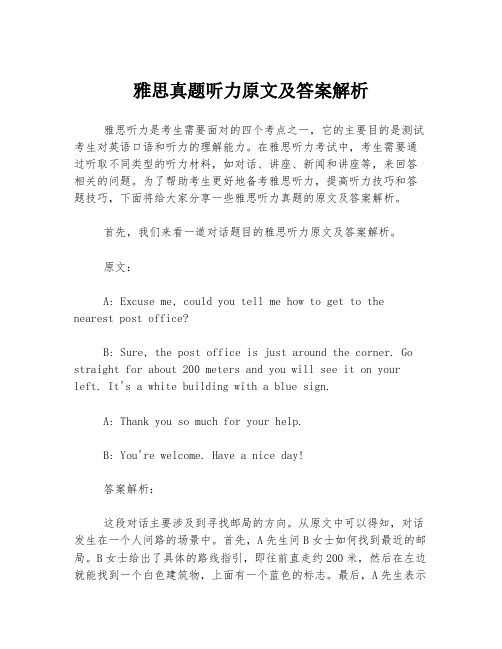
雅思真题听力原文及答案解析雅思听力是考生需要面对的四个考点之一,它的主要目的是测试考生对英语口语和听力的理解能力。
在雅思听力考试中,考生需要通过听取不同类型的听力材料,如对话、讲座、新闻和讲座等,来回答相关的问题。
为了帮助考生更好地备考雅思听力,提高听力技巧和答题技巧,下面将给大家分享一些雅思听力真题的原文及答案解析。
首先,我们来看一道对话题目的雅思听力原文及答案解析。
原文:A: Excuse me, could you tell me how to get to the nearest post office?B: Sure, the post office is just around the corner. Go straight for about 200 meters and you will see it on your left. It's a white building with a blue sign.A: Thank you so much for your help.B: You're welcome. Have a nice day!答案解析:这段对话主要涉及到寻找邮局的方向。
从原文中可以得知,对话发生在一个人问路的场景中。
首先,A先生问B女士如何找到最近的邮局。
B女士给出了具体的路线指引,即往前直走约200米,然后在左边就能找到一个白色建筑物,上面有一个蓝色的标志。
最后,A先生表示感谢,并和B女士道别。
从这个对话中,考生可以了解到在雅思听力中,常常会出现关于问路、指路的题目。
听力材料中会提供一些具体的方向指示词,如straight(直走)、around the corner(拐角处)等。
考生在备考雅思听力时,应该熟悉这些常用的方向指示词,并学会根据这些指示词来判断和选择正确的答案。
接下来,我们看一段关于讲座的雅思听力原文及答案解析。
原文:Lecturer: Good morning, everyone. Today, we are going to talk about the history of art. Art is a form of human expression that dates back to ancient times. It can be foundin cave paintings, ancient sculptures, and intricate designson pottery. Throughout history, different civilizations have developed their own unique forms of art, reflecting theculture and beliefs of the time. In this lecture, we will explore the major art movements, such as the Renaissance, Impressionism, and Cubism, and discuss how they haveinfluenced the development of art over the years.答案解析:这段讲座主要介绍了艺术的历史和不同艺术运动对艺术发展的影响。
2013年10月10日雅思听力机经解析

2013年10月10日雅思听力机经解析南京环球雅思学校施嘉宁10月第一场加试目前暂定一旧为S4(棉花种植的负面影响)场景几乎都是老面孔填空选择平分天下一句话总结:内容经典依旧只是难度攀升配对题的难度和比例延续了9月最后一场的风格选择题紧凑密集希望12号的童鞋们好运!2013年10月10日雅思听力考情回顾BY南京环球雅思施嘉宁答案仅供参考Section One版本号场景题型NEW House-renting全填空内容回忆顾客打电话租房用来举行party答案回忆顺序先后待定1.on the5th floor2.good view3.Limerick Hotel4.a week5.a small garden6.minimum number of people:357.business centre8.Saturday9.65﹪10.Phone:044298611Section Two版本号场景题型待定Travelling全选择内容回忆radio programme介绍一个railway station的发展演变答案回忆11-16单选:11.选:small engine12.待定13.选:run by local business14.选:used by cyclists15&16.待定17-20配对:车站及各自特点欢迎补充Section Three版本号场景题型待定Assignment全选择Dsicussion内容回忆两个学生Landia和James跟教授讨论Behaviour Management Research on Young Children 答案回忆21-25单选:21.为什么研究幼儿早教这个话题?选:work with them即将去幼儿园实习22.待定23.问卷调查里opening question or closed question的原因?选:more interesting24.目前的任务是?25.教授的建议是?选:过些天跟另外一位老师谈26-30配对:(答案待定)不同研究方法的评价26.observation27.videoing28.questionnaire29.read articles and books30.web researchSection Four版本号场景题型Environment全填空旧题版本号待定V111203S4内容回忆棉花种植的负面影响答案回忆31.water waste in the sustainable(可持续的)planting process32.water for irrigation(灌溉)33.extra maintenance equipment and machines34.Soil becomes highly salty by contaminants(污染物).35.致病原因:without protective clothing36.innocence and freedom37.need more energy to maintain the color38.designers inspired by nature39.clothing for sports40.Water it by the rain.。
雅思真题听力例子解析及答案
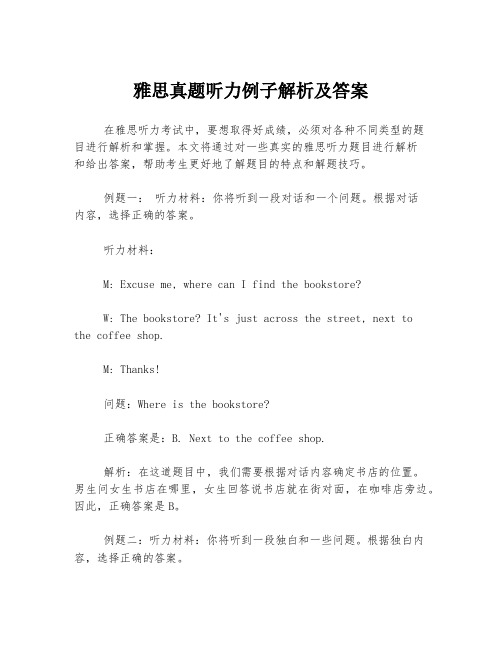
雅思真题听力例子解析及答案在雅思听力考试中,要想取得好成绩,必须对各种不同类型的题目进行解析和掌握。
本文将通过对一些真实的雅思听力题目进行解析和给出答案,帮助考生更好地了解题目的特点和解题技巧。
例题一:听力材料:你将听到一段对话和一个问题。
根据对话内容,选择正确的答案。
听力材料:M: Excuse me, where can I find the bookstore?W: The bookstore? It's just across the street, next tothe coffee shop.M: Thanks!问题:Where is the bookstore?正确答案是:B. Next to the coffee shop.解析:在这道题目中,我们需要根据对话内容确定书店的位置。
男生问女生书店在哪里,女生回答说书店就在街对面,在咖啡店旁边。
因此,正确答案是B。
例题二:听力材料:你将听到一段独白和一些问题。
根据独白内容,选择正确的答案。
听力材料:M: Good evening, ladies and gentlemen. I'm here to give a talk about the importance of exercise. Regular exercise has many benefits for our overall health. It helps to prevent chronic diseases, reduces stress levels, and improves sleep quality. Additionally, exercise is also a great way to socialize and meet new people. So, make sure to include exercise in your daily routine!问题:What is one benefit of regular exercise?正确答案是:C. It helps to prevent chronic diseases.解析:在这道题目中,我们需要根据独白内容确定定期锻炼的一个好处。
2013年5月18日雅思听力机经回忆解析
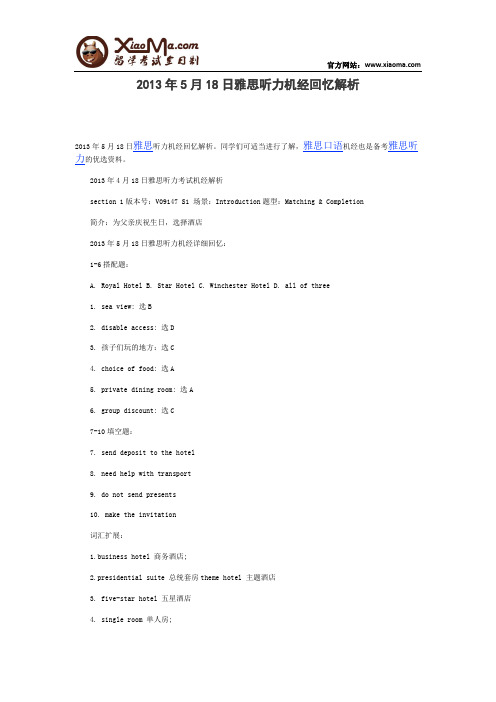
2013年5月18日雅思听力机经回忆解析2013年5月18日雅思听力机经回忆解析。
同学们可适当进行了解,雅思口语机经也是备考雅思听力的优选资料。
2013年4月18日雅思听力考试机经解析section 1版本号:V09147 S1 场景:Introduction题型:Matching & Completion简介:为父亲庆祝生日,选择酒店2013年5月18日雅思听力机经详细回忆:1-6搭配题:A. Royal HotelB. Star HotelC. Winchester HotelD. all of three1. sea view: 选B2. disable access: 选D3. 孩子们玩的地方:选C4. choice of food: 选A5. private dining room: 选A6. group discount: 选C7-10填空题:7. send deposit to the hotel8. need help with transport9. do not send presents10. make the invitation词汇扩展:1.business hotel 商务酒店;2.presidential suite 总统套房theme hotel 主题酒店3. five-star hotel 五星酒店4. single room 单人房;5. double room 双人大床房;6.twin room 标准间;7.room with an ocean view 海景房;8.suite 普通套房Section 2版本号:V30080 S2 场景:Introduction 题型:Multiple Choices / Completion简介:Ice-curling的介绍详细回忆:11-16填空题:11. the first is called the Lead12. the length of ice rink is called the Sheet13. target place is called the House14. Scottish brushes are made from horse hair15. the shoe is made of the sole of rubber16. the team captain carries a stop watch17-20单选题:17. What is the club famous for? 选C. 最有影响力的俱乐部之一18. Why was this club established? 选C. to fix regulations for the game19. In the 16th century, the curling game was not banned because:选B. good to battle20. the early implement for this game in Canada was made of: 选C. cast iron注意事项:注意首字母大写,补充历史、运动方面的词汇词汇扩展:conservation 保护,保存acid 酸,酸的carbon 碳petroleum 石油ozone 臭氧ooze 渗出,渗出物radiation 辐射greenhouse 温室solar 太阳的phenomenon 现象deterioration 恶化extinction 灭绝drought 干旱recurrent 反复发生的inundate 淹没embankment 筑堤sediment 沉积(物)delta 三角洲alluvial 冲积的dust-storm 沙尘暴barren 贫瘠的,不育的,无效的attributable 归因于deforestation 滥砍滥伐(森林) log 原木,日志伐木vegetation 植物,植被habitat 栖息地ecosystem 生态系统demographic 人口统计的counterbalance 使平衡,弥补mechanism 机理,机制precipitation 陡降,降水circulation 流通,循环meteorology 气象(学)volcano 火山eruption 喷发granite 花岗岩以上就是小编为大家整理的“2013年5月18日雅思听力机经回忆解析”部分内容,更多资料请点击雅思资料下载频道!。
2013年雅思听力题型分析
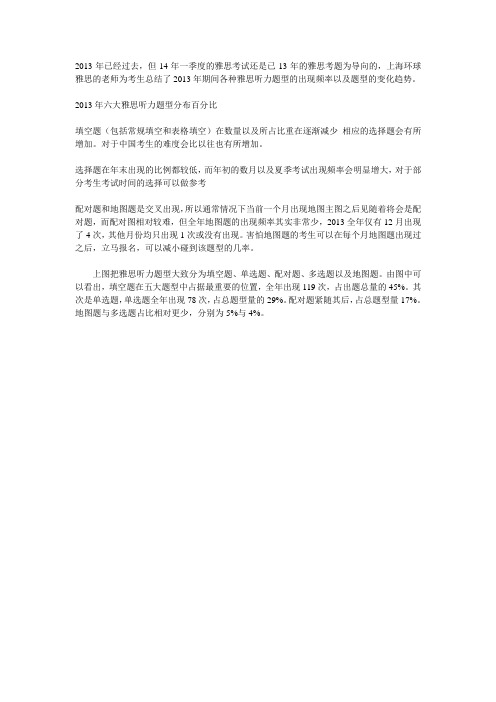
2013年已经过去,但14年一季度的雅思考试还是已13年的雅思考题为导向的,上海环球雅思的老师为考生总结了2013年期间各种雅思听力题型的出现频率以及题型的变化趋势。
2013年六大雅思听力题型分布百分比
填空题(包括常规填空和表格填空)在数量以及所占比重在逐渐减少相应的选择题会有所增加。
对于中国考生的难度会比以往也有所增加。
选择题在年末出现的比例都较低,而年初的数月以及夏季考试出现频率会明显增大,对于部分考生考试时间的选择可以做参考
配对题和地图题是交叉出现,所以通常情况下当前一个月出现地图主图之后见随着将会是配对题,而配对图相对较难,但全年地图题的出现频率其实非常少,2013全年仅有12月出现了4次,其他月份均只出现1次或没有出现。
害怕地图题的考生可以在每个月地图题出现过之后,立马报名,可以减小碰到该题型的几率。
上图把雅思听力题型大致分为填空题、单选题、配对题、多选题以及地图题。
由图中可以看出,填空题在五大题型中占据最重要的位置,全年出现119次,占出题总量的45%。
其次是单选题,单选题全年出现78次,占总题型量的29%。
配对题紧随其后,占总题型量17%。
地图题与多选题占比相对更少,分别为5%与4%。
【南通环球教育(原环球雅思)】-雅思听力提分小技巧-程玲
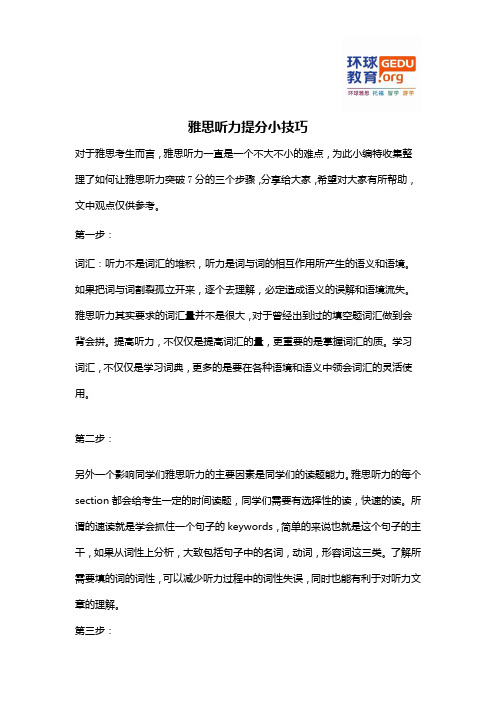
雅思听力提分小技巧
对于雅思考生而言,雅思听力一直是一个不大不小的难点,为此小编特收集整理了如何让雅思听力突破7分的三个步骤,分享给大家,希望对大家有所帮助,文中观点仅供参考。
第一步:
词汇:听力不是词汇的堆积,听力是词与词的相互作用所产生的语义和语境。
如果把词与词割裂孤立开来,逐个去理解,必定造成语义的误解和语境流失。
雅思听力其实要求的词汇量并不是很大,对于曾经出到过的填空题词汇做到会背会拼。
提高听力,不仅仅是提高词汇的量,更重要的是掌握词汇的质。
学习词汇,不仅仅是学习词典,更多的是要在各种语境和语义中领会词汇的灵活使用。
第二步:
另外一个影响同学们雅思听力的主要因素是同学们的读题能力。
雅思听力的每个section都会给考生一定的时间读题,同学们需要有选择性的读,快速的读。
所谓的速读就是学会抓住一个句子的keywords,简单的来说也就是这个句子的主干,如果从词性上分析,大致包括句子中的名词,动词,形容词这三类。
了解所需要填的词的词性,可以减少听力过程中的词性失误,同时也能有利于对听力文章的理解。
第三步:
雅思听力中不可缺少的一个题型就是数字题,这就要求学生要对数字有一定的敏感度。
灵敏性要求大家平时要多去听和说,进行反应力的训练,可以试试将自己的QQ号码,电话号码,银行卡号等等,迅速读出来以训练对数字的熟悉程度和灵敏性。
闲暇时候,自己可以试试多说说,通过说话以及耳朵的接受,锻炼自己数字听力的迅速反应力,这样子配合做题,则会有更好的收效,在考试的时候,就会发现数字反应力提高了很多!
以上就是如何让雅思听力获得高分的相关介绍,其中的方法具有一定的独特
性,最后祝大家都能考出好成绩。
2013年5月11日雅思听力考题回顾
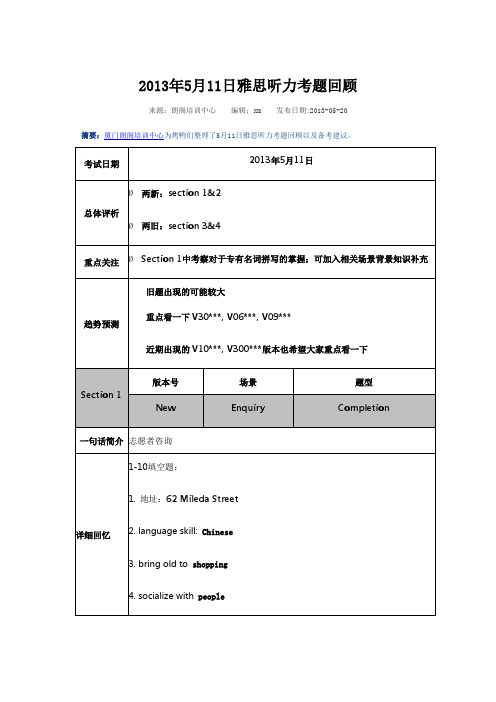
2013年5月11日雅思听力考题回顾来源:朗阁培训中心编辑:xm 发布日期:2013-05-20摘要:厦门朗阁培训中心为烤鸭们整理了5月11日雅思听力考题回顾以及备考建议。
考试日期2013年5月11日总体评析Ø 两新:section 1&2Ø 两旧:section 3&4重点关注Ø Section 1中考察对于专有名词拼写的掌握;可加入相关场景背景知识补充趋势预测旧题出现的可能较大重点看一下V30***, V06***, V09***近期出现的V10***, V300***版本也希望大家重点看一下Section 1版本号场景题型New Enquiry Completion 一句话简介志愿者咨询详细回忆1-10填空题:1.地址:62 Mileda Street2. language skill:Chinese3. bring old to shopping4. socialize with people5. license to drive6.South of river7.Wednesday8. Date to start:13th June9. put the mail on to the stairs in front of the house10. get the information on the radio重点词汇及扩展Section 1中考察了许多专有名词的拼写,如:名字、日期、地址等;强调填空题拼写格式:如专有名词的首字母大写;名词单复数等等Section 2版本号场景题型New Lecture Multiple Choices / Matching 一句话简介介绍童话详细回忆11-14单选题:11.选C.去年有些放到了radio上了12.选A. teacher写的13.选B. potential disaster14. main character:选C. held in prison15-20配对题,关于文章比赛是required还是allowed15.少于等于1500字:必须的16. illustrated introduction:自愿的17. electronic:必须的18. page:必须的19. writer name:必须的20.自愿的以下内容属于童话的基本常识:大多数童话源自于民间故事。
2013年5月18日雅思口语机经回忆解析
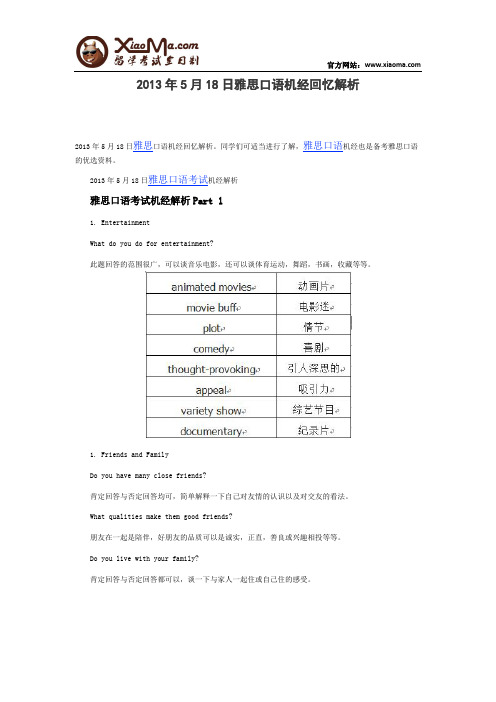
2013年5月18日雅思口语机经回忆解析2013年5月18日雅思口语机经回忆解析。
同学们可适当进行了解,雅思口语机经也是备考雅思口语的优选资料。
2013年5月18日雅思口语考试机经解析雅思口语考试机经解析Part 11. EntertainmentWhat do you do for entertainment?此题回答的范围很广,可以谈音乐电影,还可以谈体育运动,舞蹈,书画,收藏等等。
1. Friends and FamilyDo you have many close friends?肯定回答与否定回答均可,简单解释一下自己对友情的认识以及对交友的看法。
What qualities make them good friends?朋友在一起是陪伴,好朋友的品质可以是诚实,正直,善良或兴趣相投等等。
Do you live with your family?肯定回答与否定回答都可以,谈一下与家人一起住或自己住的感受。
雅思口语机经回忆解析Part 21. Describe a music group/band/singer in your country.You should say:Which person or bandWho often likes listening to their/his/her songsWhat kind of music they/he/she singsand explain why you admire them/him/her.描述一个乐队或歌手。
回答时可简要介绍一下乐队或歌手是哪个,有什么作品,音乐风格等等,再详细描述一下音乐作品或歌手本人对自己有什么影响,自己喜欢的原因。
雅思口语机经回忆解析Part3What's the difference between listening to CD and going to concerts?听CD与听演唱会的不同;听CD可以随时欣赏,音乐会可以感受现场的氛围。
雅思真题精听文章答案解析

雅思真题精听文章答案解析雅思(IELTS)是许多想要出国留学或工作的人所要参加的英语考试。
其中,听力(Listening)部分是考试的一项重要组成部分,对考生的听力技巧和能力提出了很高的要求。
为帮助考生更好地应对雅思听力部分的挑战,本文将对一些真题的答案进行解析和讨论,以帮助考生提高他们的雅思听力技能。
首先,让我们来看一个雅思听力的例子:[录音开始]男:嗨,维多利亚!你今天好吗?女:嗨,约翰!我很好。
你呢?男:我也挺好的。
对了,你最近在干什么?女:最近,我一直在专注于我的研究项目,准备着要在下个月的国际会议上发表论文。
男:哇,听起来很不错啊!你的论文是关于什么的?女:我的论文主要研究了大气污染问题,特别是城市地区的大气污染。
男:那真是一个重要的话题。
城市化进程中的污染问题确实需要得到关注和解决。
女:是的,我们需要采取措施来减少污染物的排放,保护我们的环境和健康。
[录音结束]对于这个例子,我们可以看到一些常见的问题类型。
首先,有一些关于个人问候和近况的问题,这需要考生对于常见的问候语和日常用语有一定的了解。
其次,有一个问题问到论文的话题是什么,这需要考生有一定的专业词汇和知识储备。
最后,有一个问题涉及到对于问题解决的观点和态度,这需要考生能够听懂并分辨出对话中的观点和态度。
针对这个例子,考生可以通过提前积累和学习相关领域的词汇和知识来提高听力的理解能力。
此外,经常进行听力练习,尤其是针对不同题型的练习,可以对考生的听力技能提升有很大的帮助。
同时,考生也需要注意提高对于上下文的理解,因为上下文对于整个对话的理解和问题的解答非常重要。
除了通过练习和积累知识来提高听力能力外,考生还可以尝试一些技巧来更好地解答听力问题。
比如,在听力过程中,可以试着做一些笔记或标记关键信息,以帮助记忆和理解。
同时,可以尝试通过预测答案来提前准备,这可以帮助考生在听力过程中更加专注和有针对性地听取关键信息。
总之,雅思听力考试对于考生的听力技巧和能力提出了很高的要求。
南通环球雅思--2013年9月雅思听力口语写作预测
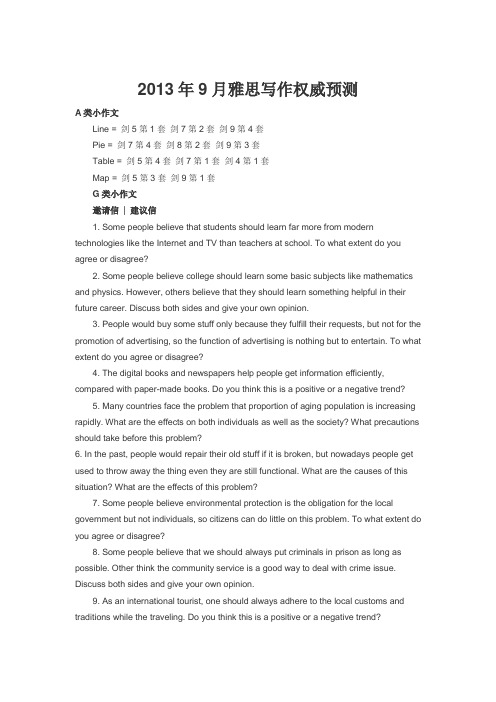
2013年9月雅思写作权威预测A类小作文Line = 剑5第1套剑7第2套剑9第4套Pie = 剑7第4套剑8第2套剑9第3套Table = 剑5第4套剑7第1套剑4第1套Map = 剑5第3套剑9第1套G类小作文邀请信| 建议信1. Some people believe that students should learn far more from modern technologies like the Internet and TV than teachers at school. To what extent do you agree or disagree?2. Some people believe college should learn some basic subjects like mathematics and physics. However, others believe that they should learn something helpful in their future career. Discuss both sides and give your own opinion.3. People would buy some stuff only because they fulfill their requests, but not for the promotion of advertising, so the function of advertising is nothing but to entertain. To what extent do you agree or disagree?4. The digital books and newspapers help people get information efficiently, compared with paper-made books. Do you think this is a positive or a negative trend?5. Many countries face the problem that proportion of aging population is increasing rapidly. What are the effects on both individuals as well as the society? What precautions should take before this problem?6. In the past, people would repair their old stuff if it is broken, but nowadays people get used to throw away the thing even they are still functional. What are the causes of this situation? What are the effects of this problem?7. Some people believe environmental protection is the obligation for the local government but not individuals, so citizens can do little on this problem. To what extent do you agree or disagree?8. Some people believe that we should always put criminals in prison as long as possible. Other think the community service is a good way to deal with crime issue. Discuss both sides and give your own opinion.9. As an international tourist, one should always adhere to the local customs and traditions while the traveling. Do you think this is a positive or a negative trend?10. Some people think government should use more tax on the basic facilities like education and health care, but not the supporting on sports and other less important things. To what extent do you agree or disagree?11. The wealth is the most important factor of happiness, while there are also other factors for individual’s happiness. Why is th ere different definition of happiness? Discuss both sides and give your own opinion.12. Some people believe that in each company, it is important to employ equal number of male and female workers. Do the advantages outweigh the disadvantages?13. The cheap air flight will give people more freedom of traveling, but bring more problems at the same time. What are those problems? Do you think this is a positive or a negative trend?14. Some people like to change their jobs as quickly as possible. However, others want to stay in one company for their whole life. Discuss both sides and give your own opinion.15. Wealth is an important standard in modern society, for many people spend most of their time in earning money. What are other standards of success? Which one do you think is the most important?16. In some cultures, the old are more valued. However, in other cultures, the young are more valued. Discuss both sides and give your own opinion.17. Some people believe that the invention of modern technology enables people to live in a simple rather than complex way. To what extent do you agree or disagree?18. The government should make all efforts to protect the lesser-known languages from dying out. However, others believe that it is a waste of financial support. Discuss both sides and give your own opinion.19. Some people believe that a country should create all kinds of foods by themselves, for the imported foods have damages on the local development. To what extent do you agree or disagree?20. Everyone should have a healthy living habit, for it is individual obligation to keep health, instead of governmental responsibility. To what extent do you agree or disagree?9月上半月雅思口语权威预测Part1第一大类基本信息类1. Name 必考全名,中文名字含义,未来换否2. Study or work超高频上学上班如果上学:大学问专业,高中问最喜欢学科如果上班:工作内容,想换吗,参加过培训吗(DP),工作后喜欢做什么3. Hometown超高频哪里,喜欢吗,特别的地方(建筑或地方),过去几年的发展,未来想在什么地方生活(DP)4. Weather喜欢什么天气,家乡天气如何,近些年的变化9月重点提防1. Family介绍你的家庭,家庭关系如何,家庭出现矛盾怎么处理2. Friends朋友多吗,如何交朋友,去哪里找到外国朋友,如何维护友谊第二大类衣食住行1. Living超高频住flat还是house,最喜欢哪个房间,如果重新装修会怎样,理想的房子2. Building喜欢什么建筑,传统的还是现代的,最喜欢哪个建筑,未来建筑会什么样3. Countryside去过郊区吗,喜欢吗,未来郊区会变成什么样子,郊区和城市的对比(DP)4. Park超高频居住地公园多吗,喜欢去吗,做什么5. Housework平时做家务吗,做什么,小孩子应该做家务吗,为什么6. Cooking超高频会做饭吗,人们应该学习做饭吗,你们国家人喜欢家里吃还是饭店吃你认为什么是健康食物7. Clothing超高频喜欢什么衣服,颜色会影响买衣服吗,居住地的衣服贵吗,过去和现在衣服的对比(DP)8. Shopping and online shopping喜欢购物吗,跟谁,频率,什么地方;喜欢网络购物吗,买什么,未来发展9. Public transport超高频居住地的交通如何,公共交通如何,你喜欢什么交通方式,未来如何改善城市交通10. Sleeping超高频几点睡/几点起床,睡前干什么,如果睡不着怎么办11. Daily routine你的典型一天,最喜欢哪个时间段(早中晚),都干什么9月重点提防1. Driving and cars会开车吗,更喜欢开车还是坐在后面,有过长途驾驶经验吗喜欢什么车,想购买什么车,中国人喜欢什么车第三大类娱乐休闲类1. TV program 超高频喜欢看电视吗,什么节目,家里人看电视喜好一样吗,什么节目在中国流行2. Music喜欢什么类型音乐,什么时候,地方听;会乐器吗,人们应该学习乐器吗3. Painting/Drawing超高频学过画画吗,有什么绘画技巧,小孩子应该学习绘画吗,为什么4. Dancing会跳舞吗,喜欢什么舞蹈,在你们国家什么舞蹈流行5. Photography超高频喜欢摄影吗,喜欢照什么,喜欢给别人照还是别人给你照,喜欢收藏照片吗(DP)6. Museum喜欢去博物馆吗,什么类型的,博物馆应该收费吗,为什么7. Boating超高频喜欢划船吗,在哪儿,什么时候,划船的好处8. Postcard喜欢明信片吗,收到过吗,明信片与邮件的区别9月重点提防1. Bag喜欢吗,什么类型,丢过吗,过去和现在用的包包区别第四大类抽象类1. Concentration超高频注意力重要吗,你的注意力好吗,如何培养注意力2. Patience超高频耐心重要吗,你的耐心好吗,如何培养耐心3. Art超高频你喜欢艺术吗,最喜欢什么艺术,居住地的艺术馆多吗,因该更多吗4. Busy or not超高频喜欢忙还是闲,什么时候最忙,忙的时候有压力吗5. Writing喜欢写作吗,高中时候写什么,写作的好处9月重点提防1. Happiness什么是快乐,金钱和快乐的关系,如何让自己更快乐第五大类二变一类1. Toy超高频同年喜欢什么玩具,现在玩具和过去的区别,为什么一些成年人保留玩具2. Advertisement超高频家乡的广告多吗,你怎么看广告?你容易受到广告影响吗?3. Trees and forest超高频你居住地的树多吗,中国人喜欢什么树,有著名的森林吗,你去过吗4. Mobile phone用手机多吗,更喜欢打电话还是发短信,未来电话会被取代吗5. News通常如何获取新闻,会上网看新闻吗,网络新闻的特点6. Gift超高频中国人喜欢送礼吗,什么情况下送,选什么作为礼物,你喜欢收到的礼物吗7. Computer and internet超高频平时用电脑多吗,上网都干什么,网络给人们生活带来什么影响Part 21. People and animals2. Places and buildings3. Objects4. Events and experiences5. Media and entertainmentPeople and animals1. An old person you respect2. A good parent3. A polite person you know4. A good neighbor5. Someone having an important job6. A person who became your friend on the first day you met7. Someone who taught you a useful skill8. An interesting person you know9. Your favorite musician/singer/music band10. A teenager you know11. A famous/successful person in your country9月重点提防1. An interesting wild animal2. A couple having a happy marriage3. A leader you admire4. A person in news you want to meetPlaces and buildings1. An interesting foreign country2. A city (you want to go to/you’ve been to)3. A seaside place you’d like to visit4. A place you studies or worked in5. A café6. A library7. A place you go for music8. A shopping street9. A crowded place10. A room you spent most of your time in11. A river/lake/part of sea you like9月重点提防1. A natural beauty2. A ancient buildingObjects1. A book (someone recommended to you/you want to read again)2. An interesting family photo3. A toy that was important to you in childhood4. A piece of Clothing5. An electronic equipment you bought for you house6. An important plant in your country7. A gift (you gave to a friend/a friend game you)9月重点提防1. A vehicle you’d like to buy2. Something expensive you boughtEvents and experiences事件类1. An interesting historic event2. An outdoor activity3. Something keeping you healthy (sport)4. A performance you watched5. A talk or speech you listened to经历类1. A change you made recently2. A perfect holiday3. A trip by public transport4. A situation of being late5. A home visit at your home6. A special meal7. A picnic you took part in8. A party you’d like to throw9. A happy event taking place recently10. A situation you helped someone/someone who helped you11. A childhood game you often played12. A story someone told you when you were a child难度题1. A school rule2. A science class3. A math lesson/something important you learnt from a math lesson4. A job you’d like to try5. A foreign language you’d like to learn(not English)9月重点提防1. A wedding you took part in2. A sport event3. Bad weather you experiencedMedia and entertainment1. A TV program or film making you laugh2. An advertisement making you buy something3. A radio program4. An important message you received5. A useful website6. A song that is meaningful to you解析:part1的话题要按部就班一个一个的clear掉,不要找捷径嫁接,会违背part1的采分原则;而part2的话题要进行主线串联,比如该预测中,人物题的近20张卡片,最后只需说4条主线就足够了。
【雅思】北京朗阁雅思2013年5月18日雅思阅读考题回顾
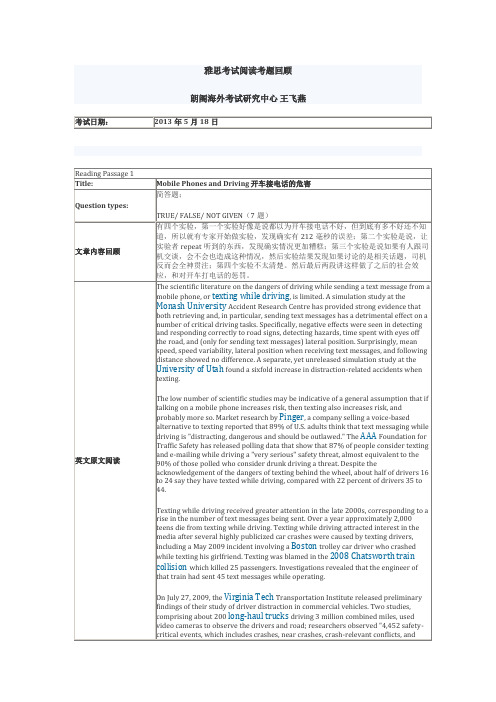
The scientific literature on the dangers of driving while sending a text message from a mobile phone, ortexting while driving, is limited. A simulation study at theMonash UniversityAccident Research Centre has provided strong evidence that both retrieving and, in particular, sending text messages has a detrimental effect on a number of critical driving tasks. Specifically, negative effects were seen in detecting and responding correctly to road signs, detecting hazards, time spent with eyes off the road, and (only for sending text messages) lateral position. Surprisingly, mean speed, speed variability, lateral position when receiving text messages, and following distance showed no difference. A separate, yet unreleased simulation study at theUniversity of Utahfound asixfoldincrease in distraction-related accidents when texting.
